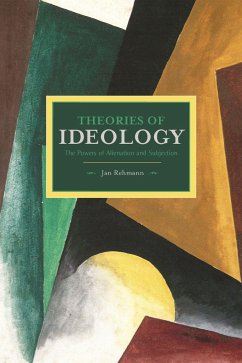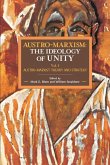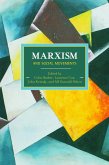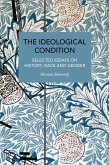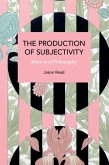- Broschiertes Buch
- Merkliste
- Auf die Merkliste
- Bewerten Bewerten
- Teilen
- Produkt teilen
- Produkterinnerung
- Produkterinnerung
Theories of Ideology is sure to become the point of reference for all future scholarly attempts to understand ideology.
Andere Kunden interessierten sich auch für
![Austro-Marxism: The Ideology of Unity Austro-Marxism: The Ideology of Unity]() Austro-Marxism: The Ideology of Unity53,99 €
Austro-Marxism: The Ideology of Unity53,99 €![Marxism and Social Movements Marxism and Social Movements]() Marxism and Social Movements42,99 €
Marxism and Social Movements42,99 €![The Ideological Condition The Ideological Condition]() Himani BannerjiThe Ideological Condition70,99 €
Himani BannerjiThe Ideological Condition70,99 €![Henryk Grossman Works, Volume 2 Henryk Grossman Works, Volume 2]() Henryk GrossmanHenryk Grossman Works, Volume 248,99 €
Henryk GrossmanHenryk Grossman Works, Volume 248,99 €![Circling Marx Circling Marx]() Peter BeilharzCircling Marx43,99 €
Peter BeilharzCircling Marx43,99 €![The Production of Subjectivity The Production of Subjectivity]() Jason ReadThe Production of Subjectivity37,99 €
Jason ReadThe Production of Subjectivity37,99 €![Theory as History Theory as History]() Jarius BanajiTheory as History43,99 €
Jarius BanajiTheory as History43,99 €-
-
-
Theories of Ideology is sure to become the point of reference for all future scholarly attempts to understand ideology.
Hinweis: Dieser Artikel kann nur an eine deutsche Lieferadresse ausgeliefert werden.
Hinweis: Dieser Artikel kann nur an eine deutsche Lieferadresse ausgeliefert werden.
Produktdetails
- Produktdetails
- Historical Materialism
- Verlag: Haymarket Books
- Seitenzahl: 350
- Erscheinungstermin: 11. November 2014
- Englisch
- Abmessung: 226mm x 151mm x 24mm
- Gewicht: 500g
- ISBN-13: 9781608464081
- ISBN-10: 1608464083
- Artikelnr.: 40448227
- Herstellerkennzeichnung
- Libri GmbH
- Europaallee 1
- 36244 Bad Hersfeld
- gpsr@libri.de
- Historical Materialism
- Verlag: Haymarket Books
- Seitenzahl: 350
- Erscheinungstermin: 11. November 2014
- Englisch
- Abmessung: 226mm x 151mm x 24mm
- Gewicht: 500g
- ISBN-13: 9781608464081
- ISBN-10: 1608464083
- Artikelnr.: 40448227
- Herstellerkennzeichnung
- Libri GmbH
- Europaallee 1
- 36244 Bad Hersfeld
- gpsr@libri.de
Jan Rehmann, Dr. phil. habil, teaches philosophy and social theories at Union Theological Seminary in New York and the Free University in Berlin. He is co-editor of the Historical-Critical Dictionary of Marxism (HKWM) and author of books on ideology, Neo-Nietzscheanism, Max Weber, the churches in Nazi Germany, and poverty.
Introduction
1. Twisted preliminaries: the 'Idéologistes' and Napoleon
1.1. Ideology as a 'natural science' of ideas
1.2. A post-Jacobin state-ideology
1.3. Napoleon's pejorative concept of ideology
2. Ideology-Critique and Ideology-Theory according to Marx and Engels
2.1. From 'inverted consciousness' to 'idealistic superstructures'
2.2. The critique of fetishism in the Critique of Political Economy
2.3. Did Marx develop a 'neutral' concept of ideology?
2.4. Engels's concept of 'ideological powers'
3. The Concept of Ideology from the Second International to
'Marxism-Leninism'
3.1. The repression of a critical concept of ideology
3.2. Lenin: bourgeois or socialist ideology?
3.3. Lenin's 'operative' approach: self-determination and hegemony
3.4. Ideology in 'Marxist-Leninist' state-philosophy
3.5. 'Ideological relationships' in the philosophy of East Germany
4. The Concept of Ideology from Lukács to the Frankfurt School
4.1. György Lukács: Ideology as reification
4.2. Horkheimer's and Adorno's critique of the 'culture-industry'
4.3. Abandoning the concept of ideology?
4.4 The 'gears of an irresistible praxis'
4.5. Ideology as 'instrumental reason' and 'identitarian thought'
4.6. From Marcuse to Habermas - and back to Max Weber?
4.7. Taking the sting out of critical theory
4.8. 'Commodity-aesthetics' as ideological promise of happiness
5. The Concept of Ideology in Gramsci's Theory of Hegemony
5.1. A significant shift in translation
5.2. Gramsci's critical concept of ideology
5.3. The critique of common sense as ideology-critique
5.4. Gramsci's concept of 'organic ideology'
5.5. 'Ideology' as a category of transition toward a theory of hegemony
5.6. The critique of corporatism and Fordism
5.7. A new type of ideology-critique on the basis of a theory of hegemony
6. Louis Althusser: Ideological State-Apparatuses and Subjection
6.1. The relationship to Gramsci
6.2. The theory of ideological state-apparatuses (ISA)
6.3. A debate on 'functionalism'
6.4. 'Ideology in general' and subject-constitution
6.5. The derivation of the 'imaginary' from Spinoza and Lacan
6.6. Lacan's universalisation of subjection and alienation
6.7. Can subjects talk back at interpellations?
7. From the Collapse of the Althusser School to Poststructuralism and
Postmodernism
7.1. Michel Pêcheux's discourse-theoretical development of Althusser's
ideology-theory
7.2. The post-Marxist turn of Ernest Laclau and Chantal Mouffe
7.3. Stuart Hall: Bridging the theory of hegemony and discourse-analysis
7.4. Michel Foucault's neo-Nietzschean trajectory from ideology to
discourse to power
7.5. Poststructuralism and postmodernism
8. Pierre Bourdieu: 'Field', 'Habitus' and 'Symbolic Violence'
8.1. The development of the concept of field from the German Ideology
8.2. Field against apparatus?
8.3. Ideology, symbolic violence, Habitus - disentangling a confused
arrangement
8.4. Bourdieu's contribution to the development of Althusser's model of
interpellation
8.5. A new determinism?
9. Ideology-Critique with the Hinterland of a Theory of the Ideological:
the 'Projekt Ideologietheorie' (PIT)
9.1. The resumption of Marx and Engels's critical concept of ideology
9.2. The ideological at the crossroads of class-domination, state and
patriarchy
9.3. 'Vergesellschaftung' - vertical, horizontal, and proto-ideological
9.4. The dialectics of the ideological: compromise-formation,
complementarity and antagonistic reclamation of the common
9.5. Fascistic modifications of the ideological
9.6. Policies of extermination and church-struggle in Nazi Germany
9.7. Further ideology-theoretical studies
10. Friedrich Hayek and the Ideological Dispositif of Neoliberalism
10.1. The formation of neoliberal hegemony
10.2. Hayek's frontal attack on 'social justice'
10.3. Overcoming 'economy' by the game of 'catallaxy'
10.4. Hayek's construct of 'negative' justice
10.5. The religious structure of Hayek's market-radicalism
10.6. A symptomatic contradiction between market-destiny and
subject-mobilisation
10.7 State and liberty: neoliberal discourse is permeated by its opposite
10.8. The road to 'disciplinary neoliberalism'
10.9. Is the hegemony of neoliberal capitalism exhausted?
11. The Unfulfilled Promises of the late Foucault and Foucauldian
'Governmentality-Studies'
11.1. Foucault's mediation of the techniques of domination and of the self
11.2. The enigmatic content of the concept of governmentality
11.3. Eliminating the inner contradictions of neoliberal ideology
11.4. A problematic equation of subjectivation and subjection
11.5. Towards an ideology-theoretical reinterpretation of
'governmentality-studies'
Bibliography
Index
1. Twisted preliminaries: the 'Idéologistes' and Napoleon
1.1. Ideology as a 'natural science' of ideas
1.2. A post-Jacobin state-ideology
1.3. Napoleon's pejorative concept of ideology
2. Ideology-Critique and Ideology-Theory according to Marx and Engels
2.1. From 'inverted consciousness' to 'idealistic superstructures'
2.2. The critique of fetishism in the Critique of Political Economy
2.3. Did Marx develop a 'neutral' concept of ideology?
2.4. Engels's concept of 'ideological powers'
3. The Concept of Ideology from the Second International to
'Marxism-Leninism'
3.1. The repression of a critical concept of ideology
3.2. Lenin: bourgeois or socialist ideology?
3.3. Lenin's 'operative' approach: self-determination and hegemony
3.4. Ideology in 'Marxist-Leninist' state-philosophy
3.5. 'Ideological relationships' in the philosophy of East Germany
4. The Concept of Ideology from Lukács to the Frankfurt School
4.1. György Lukács: Ideology as reification
4.2. Horkheimer's and Adorno's critique of the 'culture-industry'
4.3. Abandoning the concept of ideology?
4.4 The 'gears of an irresistible praxis'
4.5. Ideology as 'instrumental reason' and 'identitarian thought'
4.6. From Marcuse to Habermas - and back to Max Weber?
4.7. Taking the sting out of critical theory
4.8. 'Commodity-aesthetics' as ideological promise of happiness
5. The Concept of Ideology in Gramsci's Theory of Hegemony
5.1. A significant shift in translation
5.2. Gramsci's critical concept of ideology
5.3. The critique of common sense as ideology-critique
5.4. Gramsci's concept of 'organic ideology'
5.5. 'Ideology' as a category of transition toward a theory of hegemony
5.6. The critique of corporatism and Fordism
5.7. A new type of ideology-critique on the basis of a theory of hegemony
6. Louis Althusser: Ideological State-Apparatuses and Subjection
6.1. The relationship to Gramsci
6.2. The theory of ideological state-apparatuses (ISA)
6.3. A debate on 'functionalism'
6.4. 'Ideology in general' and subject-constitution
6.5. The derivation of the 'imaginary' from Spinoza and Lacan
6.6. Lacan's universalisation of subjection and alienation
6.7. Can subjects talk back at interpellations?
7. From the Collapse of the Althusser School to Poststructuralism and
Postmodernism
7.1. Michel Pêcheux's discourse-theoretical development of Althusser's
ideology-theory
7.2. The post-Marxist turn of Ernest Laclau and Chantal Mouffe
7.3. Stuart Hall: Bridging the theory of hegemony and discourse-analysis
7.4. Michel Foucault's neo-Nietzschean trajectory from ideology to
discourse to power
7.5. Poststructuralism and postmodernism
8. Pierre Bourdieu: 'Field', 'Habitus' and 'Symbolic Violence'
8.1. The development of the concept of field from the German Ideology
8.2. Field against apparatus?
8.3. Ideology, symbolic violence, Habitus - disentangling a confused
arrangement
8.4. Bourdieu's contribution to the development of Althusser's model of
interpellation
8.5. A new determinism?
9. Ideology-Critique with the Hinterland of a Theory of the Ideological:
the 'Projekt Ideologietheorie' (PIT)
9.1. The resumption of Marx and Engels's critical concept of ideology
9.2. The ideological at the crossroads of class-domination, state and
patriarchy
9.3. 'Vergesellschaftung' - vertical, horizontal, and proto-ideological
9.4. The dialectics of the ideological: compromise-formation,
complementarity and antagonistic reclamation of the common
9.5. Fascistic modifications of the ideological
9.6. Policies of extermination and church-struggle in Nazi Germany
9.7. Further ideology-theoretical studies
10. Friedrich Hayek and the Ideological Dispositif of Neoliberalism
10.1. The formation of neoliberal hegemony
10.2. Hayek's frontal attack on 'social justice'
10.3. Overcoming 'economy' by the game of 'catallaxy'
10.4. Hayek's construct of 'negative' justice
10.5. The religious structure of Hayek's market-radicalism
10.6. A symptomatic contradiction between market-destiny and
subject-mobilisation
10.7 State and liberty: neoliberal discourse is permeated by its opposite
10.8. The road to 'disciplinary neoliberalism'
10.9. Is the hegemony of neoliberal capitalism exhausted?
11. The Unfulfilled Promises of the late Foucault and Foucauldian
'Governmentality-Studies'
11.1. Foucault's mediation of the techniques of domination and of the self
11.2. The enigmatic content of the concept of governmentality
11.3. Eliminating the inner contradictions of neoliberal ideology
11.4. A problematic equation of subjectivation and subjection
11.5. Towards an ideology-theoretical reinterpretation of
'governmentality-studies'
Bibliography
Index
Introduction
1. Twisted preliminaries: the 'Idéologistes' and Napoleon
1.1. Ideology as a 'natural science' of ideas
1.2. A post-Jacobin state-ideology
1.3. Napoleon's pejorative concept of ideology
2. Ideology-Critique and Ideology-Theory according to Marx and Engels
2.1. From 'inverted consciousness' to 'idealistic superstructures'
2.2. The critique of fetishism in the Critique of Political Economy
2.3. Did Marx develop a 'neutral' concept of ideology?
2.4. Engels's concept of 'ideological powers'
3. The Concept of Ideology from the Second International to
'Marxism-Leninism'
3.1. The repression of a critical concept of ideology
3.2. Lenin: bourgeois or socialist ideology?
3.3. Lenin's 'operative' approach: self-determination and hegemony
3.4. Ideology in 'Marxist-Leninist' state-philosophy
3.5. 'Ideological relationships' in the philosophy of East Germany
4. The Concept of Ideology from Lukács to the Frankfurt School
4.1. György Lukács: Ideology as reification
4.2. Horkheimer's and Adorno's critique of the 'culture-industry'
4.3. Abandoning the concept of ideology?
4.4 The 'gears of an irresistible praxis'
4.5. Ideology as 'instrumental reason' and 'identitarian thought'
4.6. From Marcuse to Habermas - and back to Max Weber?
4.7. Taking the sting out of critical theory
4.8. 'Commodity-aesthetics' as ideological promise of happiness
5. The Concept of Ideology in Gramsci's Theory of Hegemony
5.1. A significant shift in translation
5.2. Gramsci's critical concept of ideology
5.3. The critique of common sense as ideology-critique
5.4. Gramsci's concept of 'organic ideology'
5.5. 'Ideology' as a category of transition toward a theory of hegemony
5.6. The critique of corporatism and Fordism
5.7. A new type of ideology-critique on the basis of a theory of hegemony
6. Louis Althusser: Ideological State-Apparatuses and Subjection
6.1. The relationship to Gramsci
6.2. The theory of ideological state-apparatuses (ISA)
6.3. A debate on 'functionalism'
6.4. 'Ideology in general' and subject-constitution
6.5. The derivation of the 'imaginary' from Spinoza and Lacan
6.6. Lacan's universalisation of subjection and alienation
6.7. Can subjects talk back at interpellations?
7. From the Collapse of the Althusser School to Poststructuralism and
Postmodernism
7.1. Michel Pêcheux's discourse-theoretical development of Althusser's
ideology-theory
7.2. The post-Marxist turn of Ernest Laclau and Chantal Mouffe
7.3. Stuart Hall: Bridging the theory of hegemony and discourse-analysis
7.4. Michel Foucault's neo-Nietzschean trajectory from ideology to
discourse to power
7.5. Poststructuralism and postmodernism
8. Pierre Bourdieu: 'Field', 'Habitus' and 'Symbolic Violence'
8.1. The development of the concept of field from the German Ideology
8.2. Field against apparatus?
8.3. Ideology, symbolic violence, Habitus - disentangling a confused
arrangement
8.4. Bourdieu's contribution to the development of Althusser's model of
interpellation
8.5. A new determinism?
9. Ideology-Critique with the Hinterland of a Theory of the Ideological:
the 'Projekt Ideologietheorie' (PIT)
9.1. The resumption of Marx and Engels's critical concept of ideology
9.2. The ideological at the crossroads of class-domination, state and
patriarchy
9.3. 'Vergesellschaftung' - vertical, horizontal, and proto-ideological
9.4. The dialectics of the ideological: compromise-formation,
complementarity and antagonistic reclamation of the common
9.5. Fascistic modifications of the ideological
9.6. Policies of extermination and church-struggle in Nazi Germany
9.7. Further ideology-theoretical studies
10. Friedrich Hayek and the Ideological Dispositif of Neoliberalism
10.1. The formation of neoliberal hegemony
10.2. Hayek's frontal attack on 'social justice'
10.3. Overcoming 'economy' by the game of 'catallaxy'
10.4. Hayek's construct of 'negative' justice
10.5. The religious structure of Hayek's market-radicalism
10.6. A symptomatic contradiction between market-destiny and
subject-mobilisation
10.7 State and liberty: neoliberal discourse is permeated by its opposite
10.8. The road to 'disciplinary neoliberalism'
10.9. Is the hegemony of neoliberal capitalism exhausted?
11. The Unfulfilled Promises of the late Foucault and Foucauldian
'Governmentality-Studies'
11.1. Foucault's mediation of the techniques of domination and of the self
11.2. The enigmatic content of the concept of governmentality
11.3. Eliminating the inner contradictions of neoliberal ideology
11.4. A problematic equation of subjectivation and subjection
11.5. Towards an ideology-theoretical reinterpretation of
'governmentality-studies'
Bibliography
Index
1. Twisted preliminaries: the 'Idéologistes' and Napoleon
1.1. Ideology as a 'natural science' of ideas
1.2. A post-Jacobin state-ideology
1.3. Napoleon's pejorative concept of ideology
2. Ideology-Critique and Ideology-Theory according to Marx and Engels
2.1. From 'inverted consciousness' to 'idealistic superstructures'
2.2. The critique of fetishism in the Critique of Political Economy
2.3. Did Marx develop a 'neutral' concept of ideology?
2.4. Engels's concept of 'ideological powers'
3. The Concept of Ideology from the Second International to
'Marxism-Leninism'
3.1. The repression of a critical concept of ideology
3.2. Lenin: bourgeois or socialist ideology?
3.3. Lenin's 'operative' approach: self-determination and hegemony
3.4. Ideology in 'Marxist-Leninist' state-philosophy
3.5. 'Ideological relationships' in the philosophy of East Germany
4. The Concept of Ideology from Lukács to the Frankfurt School
4.1. György Lukács: Ideology as reification
4.2. Horkheimer's and Adorno's critique of the 'culture-industry'
4.3. Abandoning the concept of ideology?
4.4 The 'gears of an irresistible praxis'
4.5. Ideology as 'instrumental reason' and 'identitarian thought'
4.6. From Marcuse to Habermas - and back to Max Weber?
4.7. Taking the sting out of critical theory
4.8. 'Commodity-aesthetics' as ideological promise of happiness
5. The Concept of Ideology in Gramsci's Theory of Hegemony
5.1. A significant shift in translation
5.2. Gramsci's critical concept of ideology
5.3. The critique of common sense as ideology-critique
5.4. Gramsci's concept of 'organic ideology'
5.5. 'Ideology' as a category of transition toward a theory of hegemony
5.6. The critique of corporatism and Fordism
5.7. A new type of ideology-critique on the basis of a theory of hegemony
6. Louis Althusser: Ideological State-Apparatuses and Subjection
6.1. The relationship to Gramsci
6.2. The theory of ideological state-apparatuses (ISA)
6.3. A debate on 'functionalism'
6.4. 'Ideology in general' and subject-constitution
6.5. The derivation of the 'imaginary' from Spinoza and Lacan
6.6. Lacan's universalisation of subjection and alienation
6.7. Can subjects talk back at interpellations?
7. From the Collapse of the Althusser School to Poststructuralism and
Postmodernism
7.1. Michel Pêcheux's discourse-theoretical development of Althusser's
ideology-theory
7.2. The post-Marxist turn of Ernest Laclau and Chantal Mouffe
7.3. Stuart Hall: Bridging the theory of hegemony and discourse-analysis
7.4. Michel Foucault's neo-Nietzschean trajectory from ideology to
discourse to power
7.5. Poststructuralism and postmodernism
8. Pierre Bourdieu: 'Field', 'Habitus' and 'Symbolic Violence'
8.1. The development of the concept of field from the German Ideology
8.2. Field against apparatus?
8.3. Ideology, symbolic violence, Habitus - disentangling a confused
arrangement
8.4. Bourdieu's contribution to the development of Althusser's model of
interpellation
8.5. A new determinism?
9. Ideology-Critique with the Hinterland of a Theory of the Ideological:
the 'Projekt Ideologietheorie' (PIT)
9.1. The resumption of Marx and Engels's critical concept of ideology
9.2. The ideological at the crossroads of class-domination, state and
patriarchy
9.3. 'Vergesellschaftung' - vertical, horizontal, and proto-ideological
9.4. The dialectics of the ideological: compromise-formation,
complementarity and antagonistic reclamation of the common
9.5. Fascistic modifications of the ideological
9.6. Policies of extermination and church-struggle in Nazi Germany
9.7. Further ideology-theoretical studies
10. Friedrich Hayek and the Ideological Dispositif of Neoliberalism
10.1. The formation of neoliberal hegemony
10.2. Hayek's frontal attack on 'social justice'
10.3. Overcoming 'economy' by the game of 'catallaxy'
10.4. Hayek's construct of 'negative' justice
10.5. The religious structure of Hayek's market-radicalism
10.6. A symptomatic contradiction between market-destiny and
subject-mobilisation
10.7 State and liberty: neoliberal discourse is permeated by its opposite
10.8. The road to 'disciplinary neoliberalism'
10.9. Is the hegemony of neoliberal capitalism exhausted?
11. The Unfulfilled Promises of the late Foucault and Foucauldian
'Governmentality-Studies'
11.1. Foucault's mediation of the techniques of domination and of the self
11.2. The enigmatic content of the concept of governmentality
11.3. Eliminating the inner contradictions of neoliberal ideology
11.4. A problematic equation of subjectivation and subjection
11.5. Towards an ideology-theoretical reinterpretation of
'governmentality-studies'
Bibliography
Index

